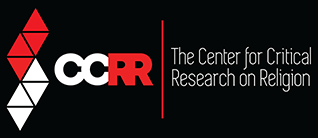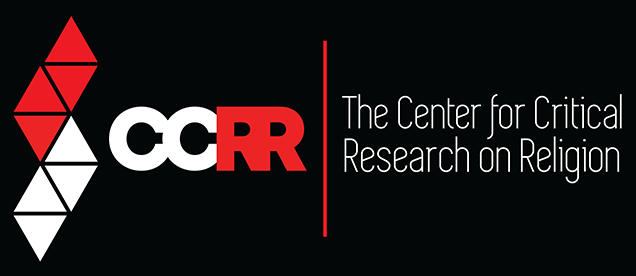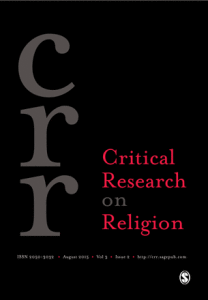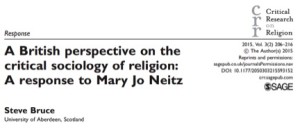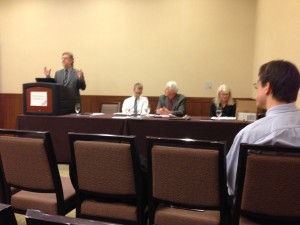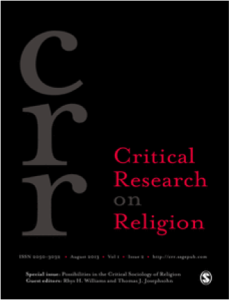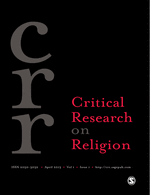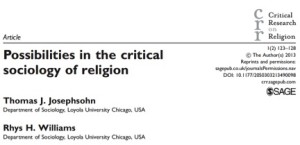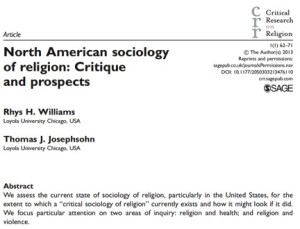“Prospects for a Critical Sociology of Religion” – Critical Research on Religion at RRA / SSSR joint meeting, 9th November 2013
Critical Research on Religion (CRR) is committed to the development of critical theoretical frames in the disciplines and subdisciplines that study religion. One subdiscipline where critical approaches have been underdeveloped is in the sociology of religion. To address this, CRR commissioned a special issue on developing a critical sociology of religion. Authors of this special issue discussed their articles at a session entitled “Prospects for a Critical Sociology of Religion.” It was held at the joint meetings of the Religious Research Association (RRA) and Society for the Scientific Study of Religion (SSSR) at the Westin Waterfront Hotel in Boston on Saturday November 9th, 2013.
Rhys Williams (Loyola University of Chicago), who guest edited the special issue, organized the panel and served as its moderator. He began the session with the history of the Society for the Scientific Study of Religion (SSSR). He was president of this association as well as editor of their journal, The Journal for the Scientific Study of Religion (JSSR). While faculty from Yale, Harvard, and Columbia Divinity Schools founded the SSSR, unlike the other North American sociology of religion associations – the Association for the Sociology of Religion (ASR) and the Religious Research Association (RRA) – SSSR was non-confessional. All of these associations have become secularized over time. However, SSSR’s original purpose to promote the social scientific study of religion was implicitly critical and Williams pointed out that Critical Research on Religion was founded in much the same spirit.
Todd Fuist (Western Washington University) discussed the article that he wrote together with Thomas Josephsohn (Loyola University of Chicago) entitled “Lines that matter, lines that don’t: Religion, boundaries, and the meaning of difference.” The article is based on separate sets of interviews conducted by both Fuist and Josephsohn. Central to their argument is the significance that religious differences play in the interactions between individuals and their perceptions of each other. Based on these interviews, Fuist and Josephsohn analyze the religious boundaries between individuals using a matrix, which categorizes whether the boundaries are permeable or impermeable or whether the religious differences are relevant or irrelevant.
Jim Spickard (University of Redlands) talked about his article “Accepting the post-colonial challenge: Theorizing a Khaldûnian approach to the Marian apparition at Medjugorje.” In his presentation, Spickard discussed the sociological ideas of Ibn Khaldûn, a 14th century Islamic thinker. A major idea of Khaldûn is al ‘assabiyyah or group feeling, which is a centripetal form social solidarity. While group feeling enables cohesion, it also causes division. Spickard used this non-Western frame to analyze the Catholic Marian apparition site at Medjgorje in Herzegovina. He explained the role it played in exacerbating the conflict between the Muslim Bosnians and Catholic Croatians during the Bosnian War in the 1990s.
Lori Beaman (University of Ottawa) discussed her article “The will to religion: Obligatory religious citizenship.” She argues that there is a “new normal” which assumes that all people are religious. It is presupposed that we all have religious needs and those claiming to have no religion are in denial. Particularly in survey research, there is a push to categorize all believers- even those who are atheists. However, with the increasing percentage of “nones”- those who do not have any religious affiliations or beliefs – there is a middle category, which defies categorization.
Finally, Michael Puett (Harvard University) served as a discussant. He artfully tied together all the papers of the session. In particular, he pointed out that our understanding of religion is shaped by Western thinkers. While this has enabled our knowledge about religion to progress, at the same time, it limits us. In order to transcend the current boundaries of our knowledge, it is necessary for us to make use of non-western thought in understanding both western and non-western religion.
As a new journal, Critical Research on Religion is critical in its reliance not only on the social sciences but on the humanities as well. It is committed to transcending boundaries- the boundaries of religious differences, the boundaries between the Occident and the non-Western world, the boundaries that are created in assuming that religion is the new normal- in short, the boundaries of our understanding about religion. The discussion of the articles in the special issue at SSSR / RRA helped to bring this to light.
Warren S. Goldstein, co-editor, Critical Research on Religion
“Toward a Critical Sociology of Religion”
Critical Research on Religion
at the 75th Annual Meeting of the
Association for the Sociology of Religion,
11th August 2013
The SAGE journal Critical Research on Religion (CRR) sponsored a session at the 75th Annual Meeting of the Association for the Sociology of Religion (ASR), which was held at the Doubletree Metropolitan Hotel in New York. Organized and convened by Rhys Williams (Loyola University of Chicago), the title of the session was “Toward a Critical Sociology of Religion.” Professor Williams is past present of the ASR, the SSSR (Society for the Scientific Study of Religion), and was editor of the Journal for the Scientific Study of Religion (JSSR), the highest ranked journal in the sociology of religion, for five years. Participants on the panel were Mary Jo Neitz (University of Missouri, Columbia), Todd Fuist (Western Washington University), and Courtney Ann Arby (Loyola University of Chicago). All of the participants were contributors to the special issue, guest edited by Professor Williams, entitled “Possibilities in the Critical Sociology of Religion” (Volume 1, Issue 2, August 2013).
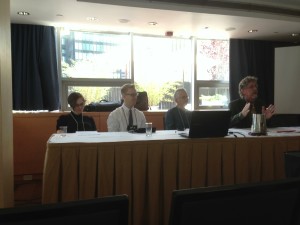
L-R) Courtney Ann Irby, Todd Fuist, Mary Jo Neitz, and Rhys Williams present at the ASR meeting 2013
Rhys Williams introduced the three panelists and provided an explanation behind the journal and the special issue. He pointed out that CRR can bridge the gap between the social sciences and humanities, bringing the sociology of religion in conversation with religious studies. He explained that a critical sociology of religion should be methodologically eclectic and not just confined to critical theory. Agreeing with the findings of a recent article by David Smilde (posted on the Immanent Frame blog of the Social Science Research Council), he argued that too much of recent sociology of religion has only focused on the positive aspects of religion without focusing on the negative.
Mary Jo Neitz gave a talk on her article in the special issue of CRR entitled “Insiders, Outsiders, Advocates and Apostates and the Religions They Study: Location and the Sociology of Religion.” Using feminist standpoint theory as her basis, she argued one must take into consideration the position of the researcher in relationship to that of the researched. Agreeing with the arguments made in the volume edited by Bender, Cadge, Levitt, Smilde (Religion on the Edge, Oxford University Press, 2012), too much research in the sociology of religion has been written by mainstream American Protestants who write about mainstream American Protestantism. Neitz presented her location matrix which takes into consideration whether both the researcher and researched are part of the dominant culture or a marginal culture and whether they are an insider (adherent) or outsider (not an adherent). As a solution to this problematic, Neitz called for “more reflexivity in all of our work.”
Todd Fuist presented the article that he coauthored with Thomas J. Josephsohn (Loyola University of Chicago) entitled “Lines that Matter, Lines that Don’t: Religion, Boundaries, and the Meaning of Difference.” This was based on interview data of members of a number of different denominations that came out of their doctorial dissertations. In this article, they discuss religious boundaries- whether they are permeable or impermeable, relevant or irrelevant. Religious differences may be more or less relevant and the boundaries between people of different religious groups may be more or less permeable. This will shape the attitudes that people of different religious background have to each other.
Finally, Courtney Ann Irby discussed her article entitled “Evangelical Elites and Young Adults Negotiating the Disrupted Landscape of Christian Relationships.” Irby’s research was based upon interviews she conducted with students at Christian evangelical colleges. Using as her baseline a number of books that were written by Christian evangelical elites, she asked students about their attitudes toward courtship, dating, and hooking up. While she found that most students had never read these books, they were indirectly influenced by them through their parents. Although the students did not embrace the ideal of courtship advocated by these books, this nevertheless did play a role in their attitudes toward dating and even more so to casual hooking up.
In the discussion, the authors were asked whether they had a particular theoretical frame that guided their analysis. While a few of the authors identified particular theories by which they were influenced, they all concurred that their research was inductive and not deductive- that rather than theory guiding their research they developed theories out of their research. These theories are implicitly critical and thus expand our understanding of the possibilities of a critical sociology of religion.
Sign up for Critical Research on Religion’s free trial here and access the August Special Issue online here.
Warren S. Goldstein, co-editor, Critical Research on Religion
Thomas Josephsohn and Rhys Williams, “Possibilities in the Critical Sociology of Religion”
Williams and Josephsohn, “North American sociology of religion: Critique and prospects”
Categories
- Critical Research on Religion
- CRR Editorials
- CRR Volume 1, Issue 1
- CRR Volume 1, Issue 2
- CRR Volume 1, Issue 3
- CRR Volume 10, Issue 1
- CRR Volume 10, Issue 2
- CRR Volume 10, Issue 3
- CRR Volume 11, Issue 1
- CRR Volume 11, Issue 2
- CRR Volume 11, Issue 3
- CRR Volume 12, Issue 1
- CRR Volume 12, Issue 2
- CRR Volume 12, Issue 3
- CRR Volume 13, Issue 1
- CRR Volume 2, Issue 1
- CRR Volume 2, Issue 2
- CRR Volume 2, Issue 3
- CRR Volume 3, Issue 1
- CRR Volume 3, Issue 2
- CRR Volume 3, Issue 3
- CRR Volume 4, Issue 1
- CRR Volume 4, Issue 2
- CRR Volume 4, Issue 3
- CRR Volume 5, Issue 1
- CRR Volume 5, Issue 2
- CRR Volume 5, Issue 3
- CRR Volume 6, Issue 1
- CRR Volume 6, Issue 2
- CRR Volume 6, Issue 3
- CRR Volume 7, Issue 1
- CRR Volume 7, Issue 2
- CRR Volume 7, Issue 3
- CRR Volume 8, Issue 1
- CRR Volume 8, Issue 2
- CRR Volume 8, Issue 3
- CRR Volume 9, Issue 1
- CRR Volume 9, Issue 2
- CRR Volume 9, Issue 3
- News
- Posts and Discussion
- Responses to CRR Editorials
- Roundtables
- Timothy Fitzgerald
- Uncategorized
- Zoom Session
Archives
- April 2025
- December 2024
- September 2024
- April 2024
- December 2023
- August 2023
- April 2023
- January 2023
- September 2022
- May 2022
- February 2022
- December 2021
- August 2021
- June 2021
- April 2021
- December 2020
- August 2020
- April 2020
- December 2019
- August 2019
- April 2019
- March 2019
- December 2018
- August 2018
- May 2018
- April 2018
- January 2018
- December 2017
- November 2017
- October 2017
- September 2017
- May 2017
- April 2017
- March 2017
- February 2017
- December 2016
- September 2016
- August 2016
- July 2016
- June 2016
- May 2016
- April 2016
- December 2015
- September 2015
- June 2015
- December 2014
- August 2014
- July 2014
- April 2014
- March 2014
- December 2013
- September 2013
- August 2013
- July 2013
- May 2013
- April 2013
- January 2013
- August 2012
- March 2012
- November 2011
- October 2011
- October 2010
- May 2010
- September 2008
